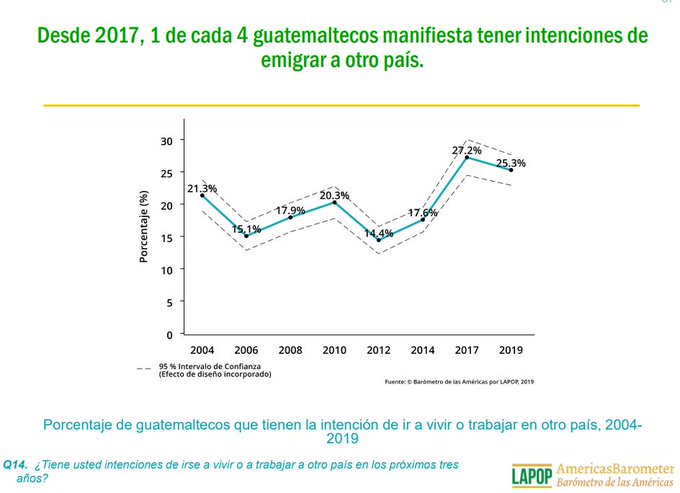Survey: One Million Guatemalans Say ‘Very Likely’ to Migrate to U.S.
Roughly one million Guatemalans say they are “very likely” to migrate to the United States in the next three years, according to a survey posted by Guatemala’s Association for Research and Social Studies.
Ten percent of Guatemalans told the survey team they strongly wish to migrate in the next three years. The nation’s fast-growing population is just above 17 million, but one-third are aged below 15. This data suggests that roughly 1.2 million Guatemalans wish to migrate during the next three years, and of those, 1 million prefer to migrate to blue-collar jobs in the United States.
Guatemala is Mexico’s southern neighbor. The survey was conducted with the Latin American Public Opinion Project at Vanderbilt University.
The survey’s prediction of more mass migration to the United States comes as Democrats portray the Central American economic migration as a humanitarian emergency for Americans to solve.
But the new poll shows that Guatemalans are less concerned about crime than during a 2017 survey. The survey showed that 45.5 percent of Guatemalans believe that insecurity is still a primary problem, down from 57 percent in 2017. Also, the percentage of Guatemalans hoping to migrate dropped from 27 percent in 2017, down to 25 percent in 2019.
The Democrats’ portrayal of the economic migration as a humanitarian problem pressures Democrats to oppose President Donald Trump’s effort to reform the various asylum and border loopholes which drive down wages in Americans’ blue-collar workplaces.
The loopholes force border officers to release nearly all economic migrants they catch at the border. Roughly 80 percent of Democrat voters tell pollsters they want those rules preserved or further loosened.
However, this racial perspective encourages cheap-labor migration into the nation’s blue-collar workplaces. Unsurprisingly, it is backed by the many business groups which want a constant inflow of low-wage migrants to replace Americans who quit low-wage jobs. The migration also helps to prevent a labor shortage that would require investors to compete for American workers by offering higher salaries or wages.
Many Guatemalans have already migrated into the U.S. labor force. Almost 58 percent of Guatemalan adults already have friends or relatives in the United States, the survey says.
The survey was conducted by the Association for Research and Social Studies and Vanderbilt’s Americas’ Barometer project, from January 22 to March 20. The survey included 1,596 respondents.
Each year, roughly four million young Americans join the workforce after graduating from high school or university.
But the federal government then imports about 1.1 million legal immigrants and refreshes a resident population of roughly 1.5 million white-collar visa workers — including roughly 1 million H-1B workers — and approximately 500,000 blue-collar visa workers.
The government also prints out more than 1 million work permits for foreigners, tolerates about eight million illegal workers, and does not punish companies for employing the hundreds of thousands of illegal migrants who sneak across the border or overstay their legal visas.
This policy of inflating the labor supply boosts economic growth for investors because it ensures that employers do not have to compete for American workers by offering higher wages and better working conditions.
This policy of flooding the market with cheap foreign white-collar graduates and blue-collar labor shifts enormous wealth from young employees towards older investors even as it also widens wealth gaps, reduces high-tech investment, increases state and local tax burdens, and hurts children’s schools and college educations. It also pushes Americans away from high-tech careers and sidelines millions of marginalized Americans, including many who are now struggling with fentanyl addictions. The labor policy also moves business investment from the heartland to the coasts, explodesrents, shrivels real estate values in the Midwest and rewards investors for creating low tech, labor-intensive workplaces.

















